Unit 1 What's the matter sectionA语法部分复习课件(共56张PPT)人教版英语八年级下册
文档属性
| 名称 | Unit 1 What's the matter sectionA语法部分复习课件(共56张PPT)人教版英语八年级下册 |

|
|
| 格式 | pptx | ||
| 文件大小 | 1.5MB | ||
| 资源类型 | 教案 | ||
| 版本资源 | 人教新目标(Go for it)版 | ||
| 科目 | 英语 | ||
| 更新时间 | 2024-05-15 00:00:00 | ||
图片预览


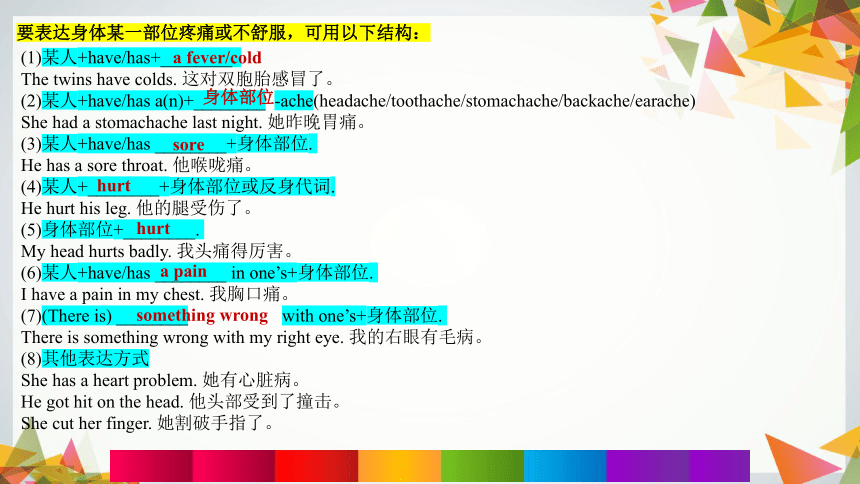
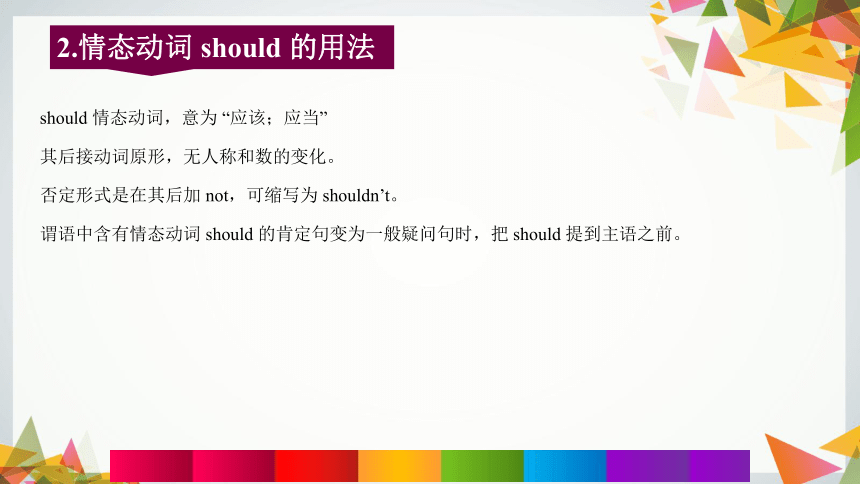
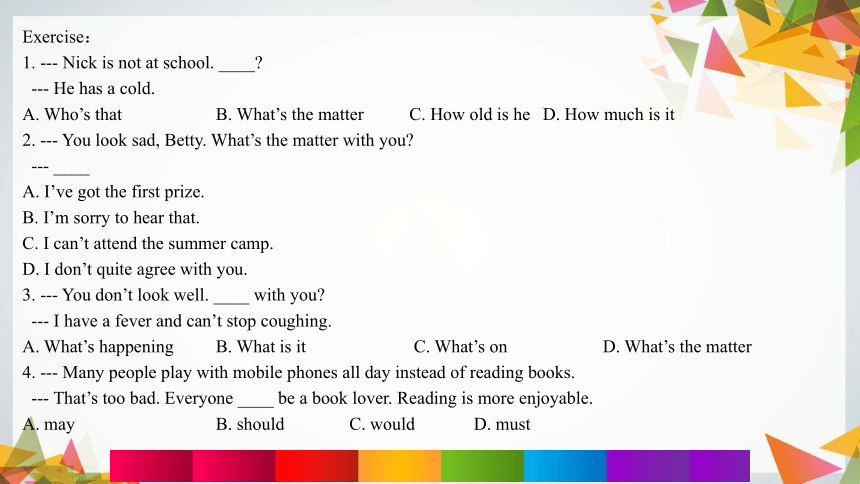
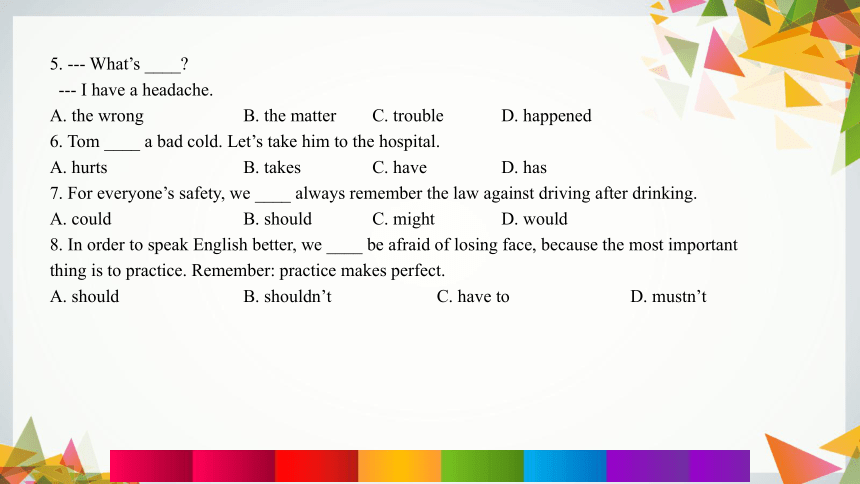
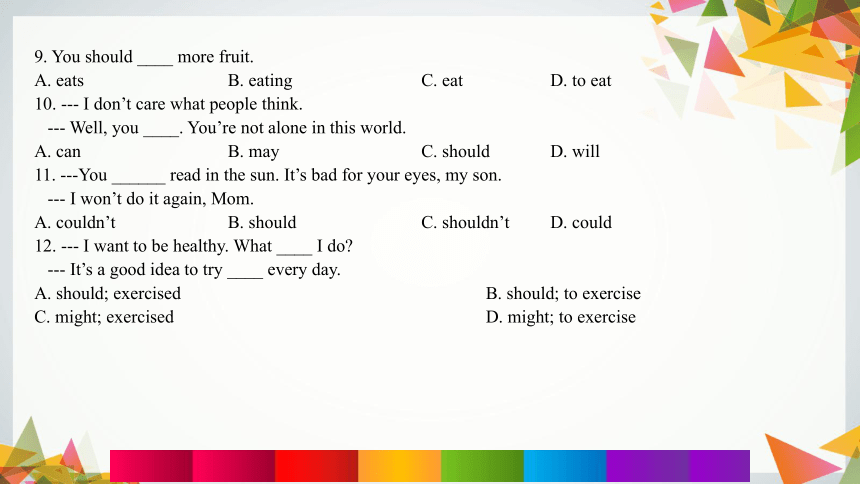
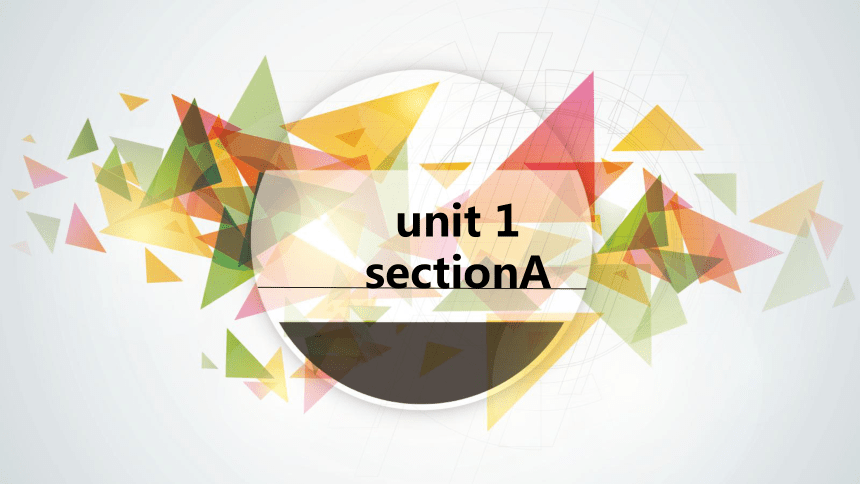
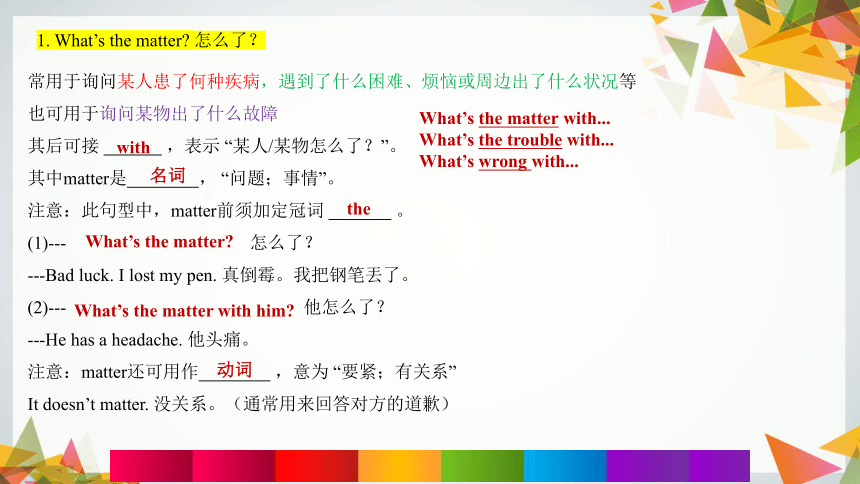
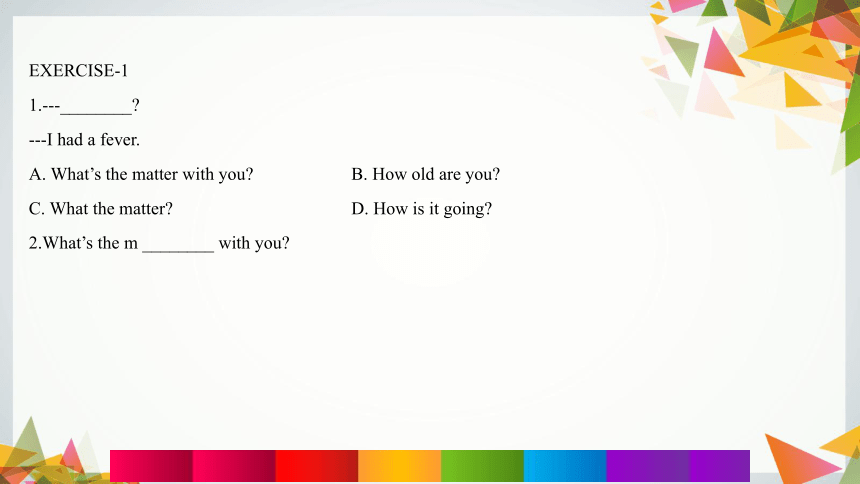
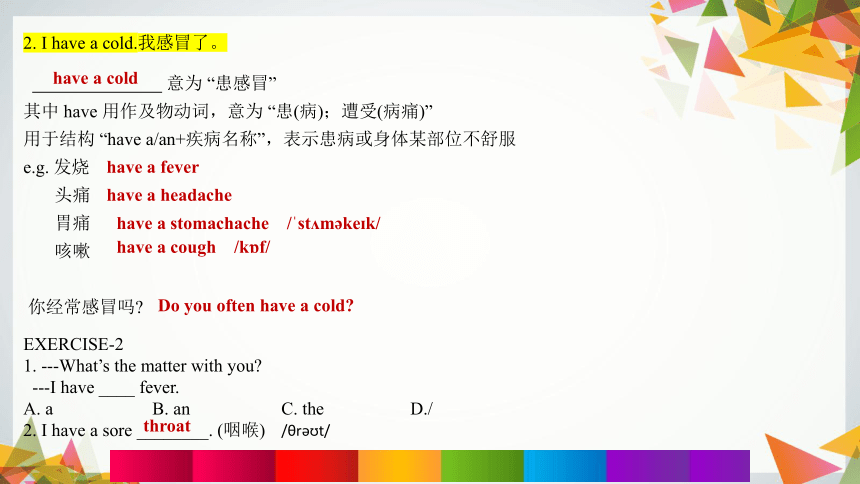
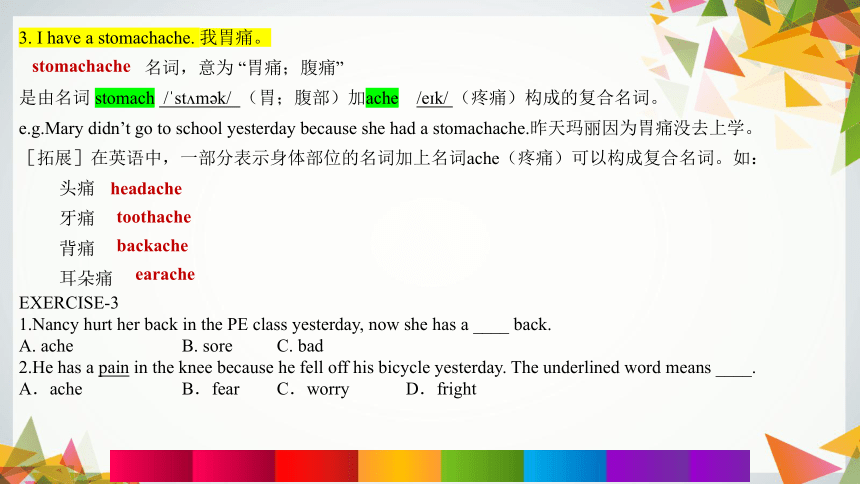
文档简介
(共56张PPT)
语法部分
1. 询问某人的健康问题及遇到麻烦时的常用表达
常用以下几种结构来表达:
What’s ________ (with sb.) (某人)怎么了?
What’s the ________ (with sb.) (某人)怎么了?
What’s the ________ (with sb.) /What’s one’s ________ (某人)出什么事了?
What ________ (to sb.) (某人)发生什么事了?
Are you OK 你没事吧?
Is there ________ wrong (with sb.) (某人)有什么事吗?
(1)某人+have/has+________.
The twins have colds. 这对双胞胎感冒了。
(2)某人+have/has a(n)+________ -ache(headache/toothache/stomachache/backache/earache)
She had a stomachache last night. 她昨晚胃痛。
(3)某人+have/has ________+身体部位.
He has a sore throat. 他喉咙痛。
(4)某人+________+身体部位或反身代词.
He hurt his leg. 他的腿受伤了。
(5)身体部位+________.
My head hurts badly. 我头痛得厉害。
(6)某人+have/has ________ in one’s+身体部位.
I have a pain in my chest. 我胸口痛。
(7)(There is) ________ with one’s+身体部位.
There is something wrong with my right eye. 我的右眼有毛病。
(8)其他表达方式
She has a heart problem. 她有心脏病。
He got hit on the head. 他头部受到了撞击。
She cut her finger. 她割破手指了。
要表达身体某一部位疼痛或不舒服,可用以下结构:
a fever/cold
身体部位
sore
hurt
hurt
a pain
something wrong
2.情态动词 should 的用法
should 情态动词,意为 “应该;应当”
其后接动词原形,无人称和数的变化。
否定形式是在其后加 not,可缩写为 shouldn’t。
谓语中含有情态动词 should 的肯定句变为一般疑问句时,把 should 提到主语之前。
Exercise:
1. --- Nick is not at school. ____
--- He has a cold.
A. Who’s that B. What’s the matter C. How old is he D. How much is it
2. --- You look sad, Betty. What’s the matter with you
--- ____
A. I’ve got the first prize.
B. I’m sorry to hear that.
C. I can’t attend the summer camp.
D. I don’t quite agree with you.
3. --- You don’t look well. ____ with you
--- I have a fever and can’t stop coughing.
A. What’s happening B. What is it C. What’s on D. What’s the matter
4. --- Many people play with mobile phones all day instead of reading books.
--- That’s too bad. Everyone ____ be a book lover. Reading is more enjoyable.
A. may B. should C. would D. must
5. --- What’s ____
--- I have a headache.
A. the wrong B. the matter C. trouble D. happened
6. Tom ____ a bad cold. Let’s take him to the hospital.
A. hurts B. takes C. have D. has
7. For everyone’s safety, we ____ always remember the law against driving after drinking.
A. could B. should C. might D. would
8. In order to speak English better, we ____ be afraid of losing face, because the most important thing is to practice. Remember: practice makes perfect.
A. should B. shouldn’t C. have to D. mustn’t
9. You should ____ more fruit.
A. eats B. eating C. eat D. to eat
10. --- I don’t care what people think.
--- Well, you ____. You’re not alone in this world.
A. can B. may C. should D. will
11. ---You ______ read in the sun. It’s bad for your eyes, my son.
--- I won’t do it again, Mom.
A. couldn’t B. should C. shouldn’t D. could
12. --- I want to be healthy. What ____ I do
--- It’s a good idea to try ____ every day.
A. should; exercised B. should; to exercise
C. might; exercised D. might; to exercise
unit 1
sectionA
常用于询问某人患了何种疾病,遇到了什么困难、烦恼或周边出了什么状况等
也可用于询问某物出了什么故障
其后可接 ,表示 “某人/某物怎么了?”。
其中matter是 , “问题;事情”。
注意:此句型中,matter前须加定冠词 。
(1)--- 怎么了?
---Bad luck. I lost my pen. 真倒霉。我把钢笔丟了。
(2)--- 他怎么了?
---He has a headache. 他头痛。
注意:matter还可用作 ,意为 “要紧;有关系”
It doesn’t matter. 没关系。(通常用来回答对方的道歉)
1. What’s the matter 怎么了?
with
What’s the matter with...
What’s the trouble with...
What’s wrong with...
名词
the
What’s the matter
What’s the matter with him
动词
EXERCISE-1
1.---________
---I had a fever.
A. What’s the matter with you B. How old are you
C. What the matter D. How is it going
2.What’s the m ________ with you
意为 “患感冒”
其中 have 用作及物动词,意为 “患(病);遭受(病痛)”
用于结构 “have a/an+疾病名称”,表示患病或身体某部位不舒服
e.g. 发烧
头痛
胃痛
咳嗽
你经常感冒吗
EXERCISE-2
1. ---What’s the matter with you
---I have ____ fever.
A. a B. an C. the D./
2. I have a sore ________. (咽喉)
2. I have a cold.我感冒了。
have a cold
have a fever
have a headache
have a stomachache / st m ke k/
have a cough /k f/
Do you often have a cold
throat
/θr t/
3. I have a stomachache. 我胃痛。
名词,意为 “胃痛;腹痛”
是由名词 stomach / st m k/ (胃;腹部)加ache /e k/ (疼痛)构成的复合名词。
e.g.Mary didn’t go to school yesterday because she had a stomachache.昨天玛丽因为胃痛没去上学。
[拓展]在英语中,一部分表示身体部位的名词加上名词ache(疼痛)可以构成复合名词。如:
头痛
牙痛
背痛
耳朵痛
EXERCISE-3
1.Nancy hurt her back in the PE class yesterday, now she has a ____ back.
A. ache B. sore C. bad
2.He has a pain in the knee because he fell off his bicycle yesterday. The underlined word means ____.
A.ache B.fear C.worry D.fright
stomachache
headache
toothache
backache
earache
(1) 形容词,意为 “疼痛的;酸痛的”,可作定语或表语。
喉咙痛
(2)back此处用作 ,意为 “ ”。
He hurt his back yesterday.他昨天弄伤了背。
[拓展]① back作 ,还可意为 “ ”。
e.g. The boy sat at the back of the classroom.
那个男孩坐在教室的后面。
②back作 ,意为 “ ”。
e.g. What time does your father often come back
你爸爸经常几点回来?
EXERCISE-4
1. She has a . 她喉咙痛。
2. My . 我的背还是很痛。
4.I have a sore back. 我背痛。
sore
have a sore throat
名词
背部
名词
背后
副词
返回,回来
sore throat
back is still sore
(2) enough此处用作 ,意为 “ ”,修饰名词时,常放在_____________
e.g. Some children in Africa don’t have to eat.一些非洲儿童没有足够的食物吃。
There was last year.去年有足够的雨水。
【拓展】①enough 用作 ,意为 “ ”,可修饰 ,
要放在被修饰的词 。
e.g. It’s in the room. 屋子里够暖和了。
He runs .他跑得足够快。
②enough 后常接 “ ” 结构,意为 “(某人/某物)足够...能做某事”。
e.g. 这个箱子足够轻,这个男孩能搬动。
太多
She worried too much.
Eating too much is bad for health.
5. She talked too much yesterday and didn’t drink enough water.
她昨天说话太多,又没喝足够的水。
(1)此处 too much 起副词的作用,修饰动词talked,放在后面作状语,意为 “ ”。
e.g. 她过于担心了。
吃得太多对健康有害。
adj.
足够的
名词前
enough food
enough rain
adv.
足够地
adv./adj.
后面(“幸福enough”)
adj./adv enough (for sb.) to do sth.
The box is light enough for the boy to move/carry.
复习:
too much
too many
much too
EXERCISE-5
1. He is not old enough to go to school. (改为同义句)
He is ________ young ________ go to school.
2.---Students always have ____ homework every weekend.
---That’s ____ bad.
A. too much; much too B. too many; many too
C. much too; too much D. many too; too many
6. lie down and rest躺下休息
(1) lie ( ; ; )此处用作不及物动词,意为 “ ”。 意为 “躺下”
e.g. Don’t lie in the sun for too long. 不要在阳光下躺太长时间。
He found a dog lying at the door. 他发现一只狗趴在门口。
【拓展】
①lie ( ; ; )作不及物动词,还可意为 “ ”。
e.g. Qingdao lies in the east of Shandong. 青岛位于山东东部。
Japan lies to the east of China. 日本位于中国东面。(in 包含 on接壤 to 相隔)
②lie ( ; ; )作不及物动词,还可意为 “ ”。 .意为 “对某人撒谎”
e.g. You are lying to me. 你在对我撒谎。
③lie作可数名词,意为 “ ”。 意为 “说谎”。
e.g. I know he told a lie just now. 我知道他刚才说了假话。
④lay( ; ; )作动词,意为 “ ”。
e.g. The hen stopped laying eggs. 这只母鸡不下蛋了。
She laid the baby down gently on the bed. 她把婴儿轻轻地放在床上。
lay lain lying
躺
lie down
lay lain lying
位于
lied lied lying
撒谎
lie to sb.
谎言
tell a lie/lies
laid laid laying
产卵,放 置
EXERCISE-6
1.Jimmy was late for school again. The head teacher warned(警告) him ____.
A. don’t tell a lie B. not telling a lie
C. not tell a lie D. not to tell a lie
2. ---I didn’t break the glass, mom. The cat did.
---You ____, the cat ____ on the floor by the fire just now.
A. lied; lied B. lay; lay C. lied; lay D. lay; lied
3. Guangdong province ____ in the east of China.
A. lies B. lays C. lying D. lied
(2)rest此处用作 ,意为 “休息”。
【拓展】rest作名词,意为 “ ”,常用于短语 “(好好)休息”。
e.g. He lies down and rests for an hour after lunch every day. 他每天午饭后躺下休息一个小时。
You must take a rest from your work. 你必须放下工作休息一下。
Let’s have a good rest. 咱们好好休息一下吧。
lie down and rest躺下休息
v.
休息
take/have a (good) rest
7. drink some hot tea with honey 喝些加蜂蜜的热茶。
介词短语with honey作后置定语,修饰hot tea。with为 ,在此处意为 “ ”,
表示事物所具有的性质、特征;
其反义词为 ,意 为 “ ”。
e.g. ---Would you like some coffee sugar 你想喝点加糖的咖啡吗?
---No, thanks. I’d like tea anything. 不,谢谢,我想要清茶。
China is a country a long history. 中国是一个有悠久历史的国家。
【拓展】
介词with的用法有很多,常见的还有:
① with意为 “ ”。
② with意为 “ ”。
③ with意为 “ ”。
④ with在一些形容词后。
e.g. Mr. Black is talking with a friend. 布莱克先生正在和一个朋友谈话。
She cut the apple with a knife. 她用刀子切苹果。
What’s the matter with him 他怎么了?
介词
有,带有,持有
without
无,没有
和……一起,与……
使用(某种具体的工具)
关于 have to do with...、help sb with sth.
be angry/strict/pleased with sb.
其它:
be good with
come up with
agree with
get along well with sb
be filled with
...
EXERCISE-7
1. They are going to buy a house ____ a garden and a garage.
A. in B. with C. at D. has
2. Linda bought a house ____ a swimming pool.
A. with B. in C. on D. from
3. She likes to sleep ____ the light on.
A. has B. in C. with D. at
4. ____ my surprise, she learned English all by herself.
A. In B. To C. with D. At
8. cough and sore throat 咳嗽且喉咙痛
cough ,意为 “咳嗽”, 意为 “患咳嗽”。
_______ ,意为 “咳嗽”。
e.g. He couldn’t stop coughing. 他咳嗽不止。
EXERCISE-8
1.The boy had a bad ____ last year.
A. cough B. coughed C. coughing D. coughs
n.
v.
have a cough
9. take your temperature量体温
是固定短语,意为 “量体温”。
e.g. The nurse took my temperature. 那位护士给我量了体温。
【拓展】
take构成的其他常见短语:
捎个口信 洗淋浴 散步
点菜 乘地铁 旅行
代替;替换 休息 冒险
EXERCISE-9
1.I didn’t ____ my temperature, but I knew I had a fever.
A. give B. set C. take D. show
2. ---Lucy is ill today. I think you can ____.
---OK. I will try to finish the work.
A. take her place B. take place
C. in the place of D. in the first place
take one’s temperature
take a message
take a shower
take a walk
take orders
take the subway
take a trip
take the place of
take a rest
take an adventure
10. No, it doesn’t sound like you have a fever. 不,听起来你不像发烧。
“听起来像”,后接 。
e.g. ---I’m going to take up a new hobby next year. 明年我打算从事一项新的爱好。
--- . 听起来像个不错的计划。
【拓展】与sound like类似的短语:
感觉像 看起来像 尝起来像
e.g. I feel like a bird in cage. 我感觉像困在笼中的鸟儿。
It looks like there is a heavy rain. 天看起来要下大雨。
sound like
名词或句子
It sounds like a good plan.
feel like
look like
taste like
EXERCISE-10
1.Liu Lu and her sister _____.
A. look the same B. are look the same
C. are look like D. look like
2. ---What ____ Lucy ____
---She is tall and slim.
A. is; look like B. does; like
C. does; look like D. does; is like
3. 听起来你的旅途似乎很愉快。
______________________________________________________________________.
4. They ____ a movie with you tonight.
A. want seeing B. feel like seeing
C. would like seeing D. feel like to see
11. …I think I sat in the same way for too long without moving.
……我想我以同样的姿势一动不动地坐得太久了。
(1)本句是一个含有宾语从句的复合句。
I think为主句,后面为省略引导词that的宾语从句。
e.g. . 我认为今晚会下雨。
(2) 意为 “太长时间”。
介词for后接一段时间,可与将来时、过去时等多种时态连用。
e.g. After walking for a long time,they all got tired. 步行了很长一段时间之后,他们都很疲惫。
(3) 介词,意为 “没有”,其后可接 作宾语。其反义词为 。
e.g. 没有水,鱼不能生存。
I think it is going to rain tonight.
for too long
without
名,代,动名
with
Fish can’t live without water.
EXERCISE-11:
1.我将在北京待一两年。
I will stay in Beijing ______ one ______ two years.
2. 尼克连续工作了3小时没休息。
Nick worked for three hours ______ ______ a break.
3. Could you please give me a hand I can’t complete the task on time ____ your help.
A. without B. under C. with D. for
4. --- Reading is a good way to spend the time on the plane.
--- That’s true. I never go travelling ____ a book.
A. without B. from C. on D. about
12. If your head and neck still hurt tomorrow, then go to a doctor.
如果明天你的头和脖子还痛的话,就去看医生。
(1)此处连词if引导 ,意为 “ ”。
在含有if引导的条件状语从句的主从复合句中,如果主句是 或主句谓语含有 ,if从句应用一般现在时表将来。(条件状语从句:主将从现,主祈从现,主情从现)
e.g. If you have questions, please ask me. 如果你有问题,请问我。
If you have questions, you can ask me. 如果你有问题,你可以问我。
(2)hurt ( ; )此处用作不及物动词,意为 “ ”,主语通常为疼痛的具体部位。
e.g.: My feet hurt when I walk. 我走路时脚痛。
【拓展】hurt还可用作及物动词,意为 “使疼痛,使受伤”。
主要指碰撞、打击等造成的肉体伤害,也可引申为精神上或情感上的“伤害”。
(3) 为固定短语,意为 “去看医生”,相当于 。
e.g.: Bill went to a doctor yesterday. 比尔昨天去看医生了。
条件状语从句
如果
hurt hurt
疼
sth. hurt
hurt sth.
go to a doctor
see a doctor
EXERCISE-12:
1. 如果你喉咙痛,多喝加蜂蜜的水。
If you ______ a sore throat, drink more water ______ honey.
2. 如果你牙痛,应该去看牙医。
If you have a toothache, you should ________ ________ ________ ________.
3. Nobody knows if he ____. If he ____ here, I’ll call you at once.
A. will come;will arrive B. will come;arrives
C. comes;will arrive D. comes; arrives
4. You can surf the Internet ____ you want to know about the 2020 World Middle School Games.
A. until B. after C. if D. before
5. 杰克用刀伤着了自己。
Jack ________ ________ with a knife.
6. 听了他的话,她感到很伤心。
She ________ ________ at his words.
13. At 9:00 a. m. yesterday, bus No, 26 was going along Zhonghua Road when the driver saw an old man lying on the side of the road.
昨天上午9点,26路公交车正行驶在中华路上,这时司机看到一位老人躺在路边。(1)此处was going为过去进行时结构。
过去进行时由 “ ”构成,表示过去某个时间正在发生或进行的动作。e.g.: I a report at 8 last night. 昨天晚上8点我正在写一份报告。(2) 辨析:see sb. doing sth.与 see sb. do sth.
see sb. doing sth. 强调看见某个动作正在进行
see sb. do sth. 强调看见动作发生的整个过程
注意:类似于see这种用法的动词,常见的还有watch, hear,notice等,
其后都可以跟do sth.或doing sth.作宾语补足语。e.g.: 我们看见他正在过马路。
我们看见他过马路了。
was/were doing
was writing
看见某人正在做某事
看见某人做了某事
We see him crossing the road.
We see him cross the road.
EXERCISE-13:
1. --- I tried to make Alice ____ her mind but I found it difficult.
--- Well, I saw you _____ that when I went past.
A. changed;do B. changes;doing
C. change;to do D. change;doing
2. 我爸爸回来时,我弟弟正躺在沙发上。
My brother ________ ________ in the sofa when my father came back.
14. The bus driver, 24-year-old Wang Ping, stopped the bus without thinking twice.
公交司机,24岁的王平,没有多想便停下了车。
(1) 24-year-old意为 “ ”,是一个复合形容词。
这种复合形容词有两个特点:一是数词、名词、形容词之间要用 连接,
二是数词后的名词须用 形式。
注意:这种复合形容词只能作 ,不作 。作表语时,用 “ ”。
e.g.: Tom is a boy. 汤姆是一个 10岁的男孩。
Tom is . 汤姆10岁了。
(2) “慎重考虑;再三考虑”
e.g.: You should think twice before making a decision. 做决定前你应该慎重考虑。
EXERCISE-14:
1. My brother has a ____ son.
A. four-years-old B. fourth-year-old
C. four-year-old D. four-year-olds
2. 不要不加思考就下决定。
Don’t make a decision without ________ ________.
24岁的
连字符
单数
定语
表语
24 years old
10-year-old
10 years old
think twice
15. He got off and asked the woman what happened. 他下车问那位妇女发生了什么事。(l)辨析:get off, get on, get into与get out of
意为“下(汽车、火车、飞机等)”
意为“登上(汽车、火车等)”,后面常跟较大的交通工具,其反义短语为get off
意为“进入(小汽车、出租车等)”,后面常跟较小的交通工具,其反义短语为get out of
意为”从(小汽车、出租车等)下来”
e.g.: The passengers got off the bus.
When I got on the bus,I saw my teacher sitting there.
He got into a taxi and left.She got out of the car and went into the hall.
(2) 不及物动词, “ ”,不能用于被动语态,且不与表示一段时间的状语连用。表示”某地/某时发生了某事”,常用” “这一结构。e.g.: . 这个故事发生在2008年。 【拓展】①表示 “某人出了某事(常指不好的事)”,要用句型_______________
e.g.:A car accident happened to her this morning.②当happen作 “ ”讲时,常用于句型__________________________ e.g.: I had no money with me. 碰巧我身上没带钱。
happen
发生
sth. happen +时间/地点
sth. happen to sb.
碰巧/恰巧发生某事
It happens/happened that...
sb. happen to do sth.
16. He expected most or all of the passengers to get off and wait for the next bus.
他预料大部分或全部乘客会下车等下一辆公交车。
(1) 意为 “预料期待某人做某事”。
e.g. 我期待他给我买件礼物。
【拓展】
① 意为 “预料期待做某事”。
e.g. 我预计一周之内回来。
② 意为 “预料…”
e.g. 许多人预料和平谈判(peace talks)不会破裂。
(2) 意为 “等待某人/某物”, 等待某人/某物做某事。
e.g. 他正等着我。
e.g. 我正在等待牙医的到来。
expect sb. to do sth.
expect to do sth.
expect that+句子
wait for sb./sth.
wait for sb./sth. to do sth.
EXERCISE--16
1.---Do you think Brazil will beat Japan
--Yes. They have better players. So I ____ them to win.
A.hope B. prefer C. expect D. want
2.---What do you expect _____ from the news
--- I hope _____ more about what’s going on around the world.
A.to learn; to know B. to learn; knowing
C. learning; to know D. learning; knowing
17. But to his surprise, they all agreed to go with him.
但令他惊讶的是,他们都同意和他一起去。
(1)“ ”结构,通常用作插入语,放在句首,其后用逗号与其他部分隔开。
e.g. 令他惊讶的是,她赢得了一等奖。
注意: “to one’s+表示感彩的名词” 意为 “令/使某人……的是”。
令/使某人高兴的是________________________
令/使某人失望的是________________________
令/使某人满意的是________________________
【拓展】
意为 “吃惊的”; 意为 “惊讶地;惊奇地”。
e.g. He is looking at the strange animal .
他正惊讶地看着那个奇怪的动物。
e.g. They when they saw a snake sleeping near the fire.
当他们看到一条蛇睡在火堆旁边时,他们很吃惊。
(2) 意为 “同意做某事”。
e.g. 她同意和我一起去购物。
【拓展】
意为 “同意某人(的意见或观点等)” 表示 “就某事达成一致”。
To one’s surprise,
To one’s joy/happiness
To one’s disappointment
To one’s satisfaction
surprised
in surprise
agree to do sth.
agree with sb.
agree on sth.
EXERCISE--17
1.---How was your life in England
---Quite different from here. _____, people there drink tea with milk.
A.In my opinion B. To my surprise C. At the beginning
2.____ her surprise, she gets good results in this exam.
A.In B. To C. With D. At
3.Bill agreed ____ me to look for my lost bike.
A.help B. helps C. helping D.to help
4.To ________ (I) surprise, my mother bought me a phone as a present.
18. Thanks to Mr. Wang and the passengers, the man was saved by the doctors in time. 多亏了王先生和乘客们,老人得到了医生们的及时救治。
(1) 意为 “由于;多亏;因为”,在句中作状语
常位于 ,有时可与 或 进行转换。e.g. , I finished the homework on time. = , I finished the homework on time. 多亏了玛丽的帮助,我按时完成了家庭作业。
辨析:thanks to与 thanks for
thanks to 由于;多亏;因为 并无当面感谢的意思, 其后可接名词或代词(做状语)
thanks for 因……而感谢 后接感谢的原因,其后可接名词、代词或动词-ing形式(做谓语)
e.g. these kind men, her son was saved. 多亏了这些好心人,她的儿子得救了。e.g. your help. 感谢你的帮助。e.g. telling me about it. 谢谢你告诉我这件事。(2) “被某人挽救/救助”,为被动结构。e.g. The sick panda was saved by the young animal keeper. 那只生病的熊猫得到了年轻饲养员的救助。
thanks to...
句首
because of... with the help of...
be saved by
EXERSCISE--18
1._____ the No. 48 bus driver, all the passengers were saved. The driver managed to stop the bus before he died.
A.Thanks to B. According to C. As for D. Thanks
2._____ the driver, we got to the station in time.
A.Thanks for B. Thanks to C. Thanks D. Thank you
3._____ free education (教育), more and more poor children can go back to school in the mountain area.
A.Without B. Thanks to C. Because D. Instead of
4.昨天多亏了他,我才及时送我朋友去医院。
______ ______ him, I took my friend to the hospital ______ ______ .
5.Thanks to these kind men, her son was saved. (改为同义句)
___________________________________________________
in time 及时 强调正好赶上事先约定的时间,没有迟到;
其后可接for引起的介词短语,表示”正赶上某事”
on time 准时,按时 指按计划做某事,强调不迟到,不早不晚
e.g. The doctors arrived in time. 医生及时赶到了。e.g. Passengers get onto the plane on time. 乘客们准时登机。
(3)辨析:in time 与on time
19.It’s sad that many people don’t want to help others because they don’t want any trouble…
因为不想惹麻烦,许多人不想帮助别人,这是令人寒心的……
(1)此处it为 ,真正的主语为that引导的从句。
e.g. It is bad that my son has a high fever. 我儿子发高烧,真是太糟了。
(2)trouble此处用作 ,意为 “ ”。
trouble的常用短语有:
处于困境中
陷入困境;造成麻烦
做某事有困难
e.g. What’s the trouble with you 你出什么事了?
e.g. The less trouble, the better. (谚)多一事不如少一事。
e.g. 学生们学习数学很困难。
[拓展]
trouble作 ,意为 “ ”。
e.g. I’m sorry to trouble you. 对不起,打扰你了。
形式主语
名词
麻烦
be in trouble
get into trouble
have trouble/problems (in) doing sth.
动词
使麻烦
EXERSISE--19
1. Don’t say that, or you’ll _____ trouble.
A. get back B. get into C. get off D. get out
2. 没有人想陷入困境。(完成译句)
Nobody wants to ________ ________ ________.
3.---What do you think of the exam
---It’s hard for me ______ it in such a short time.
A.finish B. finished C. finishing D.to finish
4.If you have any trouble _________ (use) the web site, just click on this icon for help.
5.对我来说,学习英语很困难。
____________________________________________________________________________
20.Bus No. 26 hit an old man on Zhonghua Road. 26路公交车在中华路上撞了一位老人。
此处用作及物动词,意为 “(用手或器具)击;打”。hit-hit-hit
e.g. The bus hit the bridge. 公共汽车撞到了桥上。
e.g. She hit me on the head with a book. 她用书打我的头。
e.g. The ball hit the window. 那个球击中了窗户。
注意:当表示 “打某人某个部位”时:
①通常较软或凹陷的部位用” (eye, mouth, face, stomach, etc.)”结构,意为 “打在某人的(眼睛上、嘴上、脸上、肚子上等)”;
②通常较硬或凸出的部位用 “ (head, nose, back, etc.)”结构,意为 “打在某人的(头上、鼻子上、背上等)”。hit me on my head
[拓展]
①hit用作不及物动词,意为 “打击;撞击”。
e.g. The ball hit against the wall. 球撞到了墙上。
②hit用作名词,意为 “打;打击;成功;红极一时的人或事物”。
e.g. She became a hit at that time. 她成了那时轰动一时的人物。
hit
in
on
EXERCISE--20
1.---What’s wrong with Simon He isn’t at school today.
--- His legs hurt. He was ______ by a motorcycle this morning.
A.treated B. hit C. operated D. cured
2.The ball ______ (hit) the boy on the head just now.
3.Jim’s father hit him on the head.(改为一般疑问句)
_______ Jim’s father _______ him on the head
21.The old man had a heart problem and needed to go to the hospital right away.
那位老人有心脏病,需要马上去医院。
意为 “立即;马上”,其同义短语是 。
e.g. If you have a fever, you should go to see a doctor right away.
如果你发烧了,你应该立即去看医生。
EXERCISE-21
1)My father will leave for England at once.
A. right away B. at times C. on time D. just now
2)Tom wants to see you in his office ____.
A. right away B. at times C. on time D. just now
right away
at once
22. The old man got to the hospital in time.那位老人及时到达了医院。辨析: get to, arrive与reach三者都表示 “到达”
EXERCISE-22
1)The boy is so young that he can’t ____ school.
A. go B. arrive C. reach in D. go to
2)He did not stop until he ____ the door.
A. went B. arrived C. reached D. arrive
23. Jenny cut herself. 珍妮割伤了她自己。herself用作反身代词,意为 “她自己”,其人称代词主格是she,宾格是her。e.g. Did she learn English by herself 她是自学英语的吗? I hope she’ll enjoy herself. 我希望她玩得高兴。【拓展】
代词 单数 复数
人称代词 第一人称 第二人称 第三人称 第一人称 第二人称 第三人称
I you he/she/it we you they
反身代词 myself yourself himself/herself/itself ourselves yourselves themselves
反身代词常用于下列短语中: 玩得高兴 自学
随便吃(喝) 伤着自己 独自;单独
割伤自己
enjoy oneself
teach oneself sth.
=learn sth. by oneself
help oneself (to...)
hurt oneself
by oneself
=on one’s own=alone
cut oneself
EXERCISE-23
1)Be careful with the knife. You may hurt ____.
A. himself B. ourselves C. myself D. yourself
2)---Kate, I’m going to business. Please look after _____ well.
---Don’t worry, Mom. I will.
A. you B. your C. yourself D. yourselves
3)They could look after _____ when they were six.
A. ourselves B. themselves C. yourselves D. yourself
24.Did you hurt yourself playing soccer 你踢足球时伤着自己了吗
此处 为现在分词短语作时间状语,
常在前面加上when或while,相当于时间状语从句 。
她跳舞时伤了腿。
EXERCISE-24
1)Speaking in the public, he will surely be very cheerful. (句型转换)
________ ________ ________ in public, he will surely be very cheerful
2)Hearing their teacher’s voice, the pupils stopped talking at once.
The pupils stopped talking at once _______ _______ _______ their teacher’s voice.
playing soccer
when you played soccer
She hurt her leg dancing
When he speaks
when they heard
25.Did you fall down 你摔倒了吗?
意为 “摔倒;跌倒;倒塌”,是不及物动词短语,
其后跟宾语时须加介词 。
此时 相当于 ,意为 “从....上掉/摔下来”。
e.g. When the little girl ran across the street, she fell down.
当那个小女孩跑过街道时,她摔倒了。
He his bike yesterday. =He his bike yesterday.
昨天他从自行车上摔了下来。
I don’t think the tower will fall down.
我认为这座塔不会倒塌。
【拓展】fall的其他常见短语:
落后,跟不上
落入
爱上
跌倒
入睡
fall down
from
fall down from fall off
EXERCISE-25
1.There’s nothing to be afraid of. The sky won’t ____.
A. fall behind B. fall down C. fall in love with D. fall over(摔倒)
2.Babies often ____ when they are learning to walk.
A. cut down B. fall asleep C. fall down D. cut up
单词 词性 释义 单词 词性 释义
问题;事情 牙痛
疼痛的;酸痛的 头痛
胃痛;腹痛 间歇;休息
脚;足 (使)疼痛;受伤
颈;脖子 乘客;旅客
胃;腹部 离开(某处);不工作;从……去掉
发烧 朝;向
躺;平躺 问题;苦恼
放松;休息 (用手或器具)击;打
她自己
1._______________ 患感冒/发烧/咳嗽 2. _______________牙痛(头痛、耳痛、胃痛) 3. _______________喉咙/背/眼睛/膝盖/脚痛 4. _______________说得太多_______________太多学生 5. _______________躺下休息 6. _______________喝些加蜂蜜的热茶 7. _______________看牙医 8. _______________拍X光片 9. _______________量体温 10. ______________割伤自己 11. ______________在…上敷药 12. ______________整个周末______________在周末 13. ______________需要去做某事 14. ______________从…带走… 15. ______________很长时间 16. ______________没动 17. ______________看医生 18. ______________沿着…走
19. ______________看见某人正在做某事
20. ______________在马路边
21. ______________紧挨着
22. ______________大喊救命
23. ______________下/上车
24. ______________患心脏病
25. ______________期望某人做某事
26. ______________使某人惊奇的是
27. ______________同意做某事
28. ______________多亏;由于
29. ______________及时______________准时
30. ______________考虑
31. ______________立刻;马上
32. ______________陷人麻烦
33. ______________干正确的事
34. ______________跌倒
Section A
I.单项选择。
1. What is ____ you, young man
A. matter with B. the matter with C. the matters with D. the matter to
2.---I have a bad headache.
--- ____.
A. I’m sorry to hear that B. You should be more careful
C. That’s not bad D. You’re so careless
3. Look! There is a pen ____ on the ground. Whose is it
A. lay B. laying C. lying D. laid
4. Eating ____ is bad for your health.
A. too many B. much too C. many too D. too much
5. The bus is coming. Let’s ____ it.
A. get in B. get up C. get on D. get off
6. ---Do you think Brazil will beat Japan
---Yes. They have better players. So I ____ them to win.
A. hope B. prefer C. expect D. want
7. --- ____ the doctors, the most beautiful teacher Zhang Lili is out of danger.
---We wish her to live a healthy and happy life in the future.
A. Thanks for B. Thanks to C. As for D. Because
8.---Jack, I have ____ working out the math problem.
---Don’t worry. Let me help you.
A. fun B. trouble C. experience D. happiness
9. This movie wasn’t ____. He fell asleep half way through it.
A. interesting enough B. enough interesting
C. interested enough D. enough interested
10.When I walked past the park, I saw some old people ____ Chinese Taichi.
A. did B. do C. was doing D. doing
11. In fact, he ____ in bed all the morning without doing anything, but he ____ to me about that.
A. lied; lied B. lay; lay C. lied; lay D. lay; lied
12. The film ____ is very fun.
A. it’s B. itself C. it D. its
13. All our teachers expects us ____ better and better.
A. studied B. studying C. to study D. study
14. Don’t forget to take your bag when you ____ the bus.
A. get off B. take off C. turn off D. put off
15. I read an interesting story and I can’t keep it to ____ and want to share it with you.
A. I B. me C. myself D. my
II.用首字母或括号中词语的正确形式填空。
1. I think everyone has two ________ (foot).
2. The old man has a serious ________ (ill).
3. To ________ (us) surprise, he ________ (not) go there yesterday.
4. What’s the matter with ________ (he)
5. You look tired, you should ________ (lie) down and rest.
6. Tom usually ________ (come) to school at seven in the morning last term.
7. She ate too much, and she had a s________.
8. --- Where is the boy
--- I don’t know. He _________ (lie) in bed just now.
9. The girl fell d________ from the bike and hurt herself.
10. Take my temperature. Maybe I have a f________.
III.句型转换及翻译。
1. She has a backache. (对划线部分提问)
What’s ________ ________ with ________
2. 由于你的帮助,我考试及格了。(完成译句)
________ ________ your help, I passed the exam.
3. 令我们惊讶的是,她今天早上迟到了。(完成译句)
________ ________ ________, she was late this morning.
4. 没有人想陷入困境。(完成译句)
Nobody wants to ________ ________ ________.
5. 你可以躺下休息一会儿。(完成译句)
You may ________ ________ and ________ for a while.
6. 如果他发生了什么事,让我知道。(完成译句)
If something ________ ________ him, let me know.
7. You should eat something sweet. (改为否定句)
You ________ eat ________ sweet.
8. David hurt himself in P.E. class. (改为否定句)
David _________ _________ himself in P.E. class.
9. He is so tall that he can reach the top of the closet. (同义句)
He is _________ ________ ________ reach the top of the closet.
10. She has a sore eye. (改为一般疑问句)
________ she ________ a sore eye
Thank you
语法部分
1. 询问某人的健康问题及遇到麻烦时的常用表达
常用以下几种结构来表达:
What’s ________ (with sb.) (某人)怎么了?
What’s the ________ (with sb.) (某人)怎么了?
What’s the ________ (with sb.) /What’s one’s ________ (某人)出什么事了?
What ________ (to sb.) (某人)发生什么事了?
Are you OK 你没事吧?
Is there ________ wrong (with sb.) (某人)有什么事吗?
(1)某人+have/has+________.
The twins have colds. 这对双胞胎感冒了。
(2)某人+have/has a(n)+________ -ache(headache/toothache/stomachache/backache/earache)
She had a stomachache last night. 她昨晚胃痛。
(3)某人+have/has ________+身体部位.
He has a sore throat. 他喉咙痛。
(4)某人+________+身体部位或反身代词.
He hurt his leg. 他的腿受伤了。
(5)身体部位+________.
My head hurts badly. 我头痛得厉害。
(6)某人+have/has ________ in one’s+身体部位.
I have a pain in my chest. 我胸口痛。
(7)(There is) ________ with one’s+身体部位.
There is something wrong with my right eye. 我的右眼有毛病。
(8)其他表达方式
She has a heart problem. 她有心脏病。
He got hit on the head. 他头部受到了撞击。
She cut her finger. 她割破手指了。
要表达身体某一部位疼痛或不舒服,可用以下结构:
a fever/cold
身体部位
sore
hurt
hurt
a pain
something wrong
2.情态动词 should 的用法
should 情态动词,意为 “应该;应当”
其后接动词原形,无人称和数的变化。
否定形式是在其后加 not,可缩写为 shouldn’t。
谓语中含有情态动词 should 的肯定句变为一般疑问句时,把 should 提到主语之前。
Exercise:
1. --- Nick is not at school. ____
--- He has a cold.
A. Who’s that B. What’s the matter C. How old is he D. How much is it
2. --- You look sad, Betty. What’s the matter with you
--- ____
A. I’ve got the first prize.
B. I’m sorry to hear that.
C. I can’t attend the summer camp.
D. I don’t quite agree with you.
3. --- You don’t look well. ____ with you
--- I have a fever and can’t stop coughing.
A. What’s happening B. What is it C. What’s on D. What’s the matter
4. --- Many people play with mobile phones all day instead of reading books.
--- That’s too bad. Everyone ____ be a book lover. Reading is more enjoyable.
A. may B. should C. would D. must
5. --- What’s ____
--- I have a headache.
A. the wrong B. the matter C. trouble D. happened
6. Tom ____ a bad cold. Let’s take him to the hospital.
A. hurts B. takes C. have D. has
7. For everyone’s safety, we ____ always remember the law against driving after drinking.
A. could B. should C. might D. would
8. In order to speak English better, we ____ be afraid of losing face, because the most important thing is to practice. Remember: practice makes perfect.
A. should B. shouldn’t C. have to D. mustn’t
9. You should ____ more fruit.
A. eats B. eating C. eat D. to eat
10. --- I don’t care what people think.
--- Well, you ____. You’re not alone in this world.
A. can B. may C. should D. will
11. ---You ______ read in the sun. It’s bad for your eyes, my son.
--- I won’t do it again, Mom.
A. couldn’t B. should C. shouldn’t D. could
12. --- I want to be healthy. What ____ I do
--- It’s a good idea to try ____ every day.
A. should; exercised B. should; to exercise
C. might; exercised D. might; to exercise
unit 1
sectionA
常用于询问某人患了何种疾病,遇到了什么困难、烦恼或周边出了什么状况等
也可用于询问某物出了什么故障
其后可接 ,表示 “某人/某物怎么了?”。
其中matter是 , “问题;事情”。
注意:此句型中,matter前须加定冠词 。
(1)--- 怎么了?
---Bad luck. I lost my pen. 真倒霉。我把钢笔丟了。
(2)--- 他怎么了?
---He has a headache. 他头痛。
注意:matter还可用作 ,意为 “要紧;有关系”
It doesn’t matter. 没关系。(通常用来回答对方的道歉)
1. What’s the matter 怎么了?
with
What’s the matter with...
What’s the trouble with...
What’s wrong with...
名词
the
What’s the matter
What’s the matter with him
动词
EXERCISE-1
1.---________
---I had a fever.
A. What’s the matter with you B. How old are you
C. What the matter D. How is it going
2.What’s the m ________ with you
意为 “患感冒”
其中 have 用作及物动词,意为 “患(病);遭受(病痛)”
用于结构 “have a/an+疾病名称”,表示患病或身体某部位不舒服
e.g. 发烧
头痛
胃痛
咳嗽
你经常感冒吗
EXERCISE-2
1. ---What’s the matter with you
---I have ____ fever.
A. a B. an C. the D./
2. I have a sore ________. (咽喉)
2. I have a cold.我感冒了。
have a cold
have a fever
have a headache
have a stomachache / st m ke k/
have a cough /k f/
Do you often have a cold
throat
/θr t/
3. I have a stomachache. 我胃痛。
名词,意为 “胃痛;腹痛”
是由名词 stomach / st m k/ (胃;腹部)加ache /e k/ (疼痛)构成的复合名词。
e.g.Mary didn’t go to school yesterday because she had a stomachache.昨天玛丽因为胃痛没去上学。
[拓展]在英语中,一部分表示身体部位的名词加上名词ache(疼痛)可以构成复合名词。如:
头痛
牙痛
背痛
耳朵痛
EXERCISE-3
1.Nancy hurt her back in the PE class yesterday, now she has a ____ back.
A. ache B. sore C. bad
2.He has a pain in the knee because he fell off his bicycle yesterday. The underlined word means ____.
A.ache B.fear C.worry D.fright
stomachache
headache
toothache
backache
earache
(1) 形容词,意为 “疼痛的;酸痛的”,可作定语或表语。
喉咙痛
(2)back此处用作 ,意为 “ ”。
He hurt his back yesterday.他昨天弄伤了背。
[拓展]① back作 ,还可意为 “ ”。
e.g. The boy sat at the back of the classroom.
那个男孩坐在教室的后面。
②back作 ,意为 “ ”。
e.g. What time does your father often come back
你爸爸经常几点回来?
EXERCISE-4
1. She has a . 她喉咙痛。
2. My . 我的背还是很痛。
4.I have a sore back. 我背痛。
sore
have a sore throat
名词
背部
名词
背后
副词
返回,回来
sore throat
back is still sore
(2) enough此处用作 ,意为 “ ”,修饰名词时,常放在_____________
e.g. Some children in Africa don’t have to eat.一些非洲儿童没有足够的食物吃。
There was last year.去年有足够的雨水。
【拓展】①enough 用作 ,意为 “ ”,可修饰 ,
要放在被修饰的词 。
e.g. It’s in the room. 屋子里够暖和了。
He runs .他跑得足够快。
②enough 后常接 “ ” 结构,意为 “(某人/某物)足够...能做某事”。
e.g. 这个箱子足够轻,这个男孩能搬动。
太多
She worried too much.
Eating too much is bad for health.
5. She talked too much yesterday and didn’t drink enough water.
她昨天说话太多,又没喝足够的水。
(1)此处 too much 起副词的作用,修饰动词talked,放在后面作状语,意为 “ ”。
e.g. 她过于担心了。
吃得太多对健康有害。
adj.
足够的
名词前
enough food
enough rain
adv.
足够地
adv./adj.
后面(“幸福enough”)
adj./adv enough (for sb.) to do sth.
The box is light enough for the boy to move/carry.
复习:
too much
too many
much too
EXERCISE-5
1. He is not old enough to go to school. (改为同义句)
He is ________ young ________ go to school.
2.---Students always have ____ homework every weekend.
---That’s ____ bad.
A. too much; much too B. too many; many too
C. much too; too much D. many too; too many
6. lie down and rest躺下休息
(1) lie ( ; ; )此处用作不及物动词,意为 “ ”。 意为 “躺下”
e.g. Don’t lie in the sun for too long. 不要在阳光下躺太长时间。
He found a dog lying at the door. 他发现一只狗趴在门口。
【拓展】
①lie ( ; ; )作不及物动词,还可意为 “ ”。
e.g. Qingdao lies in the east of Shandong. 青岛位于山东东部。
Japan lies to the east of China. 日本位于中国东面。(in 包含 on接壤 to 相隔)
②lie ( ; ; )作不及物动词,还可意为 “ ”。 .意为 “对某人撒谎”
e.g. You are lying to me. 你在对我撒谎。
③lie作可数名词,意为 “ ”。 意为 “说谎”。
e.g. I know he told a lie just now. 我知道他刚才说了假话。
④lay( ; ; )作动词,意为 “ ”。
e.g. The hen stopped laying eggs. 这只母鸡不下蛋了。
She laid the baby down gently on the bed. 她把婴儿轻轻地放在床上。
lay lain lying
躺
lie down
lay lain lying
位于
lied lied lying
撒谎
lie to sb.
谎言
tell a lie/lies
laid laid laying
产卵,放 置
EXERCISE-6
1.Jimmy was late for school again. The head teacher warned(警告) him ____.
A. don’t tell a lie B. not telling a lie
C. not tell a lie D. not to tell a lie
2. ---I didn’t break the glass, mom. The cat did.
---You ____, the cat ____ on the floor by the fire just now.
A. lied; lied B. lay; lay C. lied; lay D. lay; lied
3. Guangdong province ____ in the east of China.
A. lies B. lays C. lying D. lied
(2)rest此处用作 ,意为 “休息”。
【拓展】rest作名词,意为 “ ”,常用于短语 “(好好)休息”。
e.g. He lies down and rests for an hour after lunch every day. 他每天午饭后躺下休息一个小时。
You must take a rest from your work. 你必须放下工作休息一下。
Let’s have a good rest. 咱们好好休息一下吧。
lie down and rest躺下休息
v.
休息
take/have a (good) rest
7. drink some hot tea with honey 喝些加蜂蜜的热茶。
介词短语with honey作后置定语,修饰hot tea。with为 ,在此处意为 “ ”,
表示事物所具有的性质、特征;
其反义词为 ,意 为 “ ”。
e.g. ---Would you like some coffee sugar 你想喝点加糖的咖啡吗?
---No, thanks. I’d like tea anything. 不,谢谢,我想要清茶。
China is a country a long history. 中国是一个有悠久历史的国家。
【拓展】
介词with的用法有很多,常见的还有:
① with意为 “ ”。
② with意为 “ ”。
③ with意为 “ ”。
④ with在一些形容词后。
e.g. Mr. Black is talking with a friend. 布莱克先生正在和一个朋友谈话。
She cut the apple with a knife. 她用刀子切苹果。
What’s the matter with him 他怎么了?
介词
有,带有,持有
without
无,没有
和……一起,与……
使用(某种具体的工具)
关于 have to do with...、help sb with sth.
be angry/strict/pleased with sb.
其它:
be good with
come up with
agree with
get along well with sb
be filled with
...
EXERCISE-7
1. They are going to buy a house ____ a garden and a garage.
A. in B. with C. at D. has
2. Linda bought a house ____ a swimming pool.
A. with B. in C. on D. from
3. She likes to sleep ____ the light on.
A. has B. in C. with D. at
4. ____ my surprise, she learned English all by herself.
A. In B. To C. with D. At
8. cough and sore throat 咳嗽且喉咙痛
cough ,意为 “咳嗽”, 意为 “患咳嗽”。
_______ ,意为 “咳嗽”。
e.g. He couldn’t stop coughing. 他咳嗽不止。
EXERCISE-8
1.The boy had a bad ____ last year.
A. cough B. coughed C. coughing D. coughs
n.
v.
have a cough
9. take your temperature量体温
是固定短语,意为 “量体温”。
e.g. The nurse took my temperature. 那位护士给我量了体温。
【拓展】
take构成的其他常见短语:
捎个口信 洗淋浴 散步
点菜 乘地铁 旅行
代替;替换 休息 冒险
EXERCISE-9
1.I didn’t ____ my temperature, but I knew I had a fever.
A. give B. set C. take D. show
2. ---Lucy is ill today. I think you can ____.
---OK. I will try to finish the work.
A. take her place B. take place
C. in the place of D. in the first place
take one’s temperature
take a message
take a shower
take a walk
take orders
take the subway
take a trip
take the place of
take a rest
take an adventure
10. No, it doesn’t sound like you have a fever. 不,听起来你不像发烧。
“听起来像”,后接 。
e.g. ---I’m going to take up a new hobby next year. 明年我打算从事一项新的爱好。
--- . 听起来像个不错的计划。
【拓展】与sound like类似的短语:
感觉像 看起来像 尝起来像
e.g. I feel like a bird in cage. 我感觉像困在笼中的鸟儿。
It looks like there is a heavy rain. 天看起来要下大雨。
sound like
名词或句子
It sounds like a good plan.
feel like
look like
taste like
EXERCISE-10
1.Liu Lu and her sister _____.
A. look the same B. are look the same
C. are look like D. look like
2. ---What ____ Lucy ____
---She is tall and slim.
A. is; look like B. does; like
C. does; look like D. does; is like
3. 听起来你的旅途似乎很愉快。
______________________________________________________________________.
4. They ____ a movie with you tonight.
A. want seeing B. feel like seeing
C. would like seeing D. feel like to see
11. …I think I sat in the same way for too long without moving.
……我想我以同样的姿势一动不动地坐得太久了。
(1)本句是一个含有宾语从句的复合句。
I think为主句,后面为省略引导词that的宾语从句。
e.g. . 我认为今晚会下雨。
(2) 意为 “太长时间”。
介词for后接一段时间,可与将来时、过去时等多种时态连用。
e.g. After walking for a long time,they all got tired. 步行了很长一段时间之后,他们都很疲惫。
(3) 介词,意为 “没有”,其后可接 作宾语。其反义词为 。
e.g. 没有水,鱼不能生存。
I think it is going to rain tonight.
for too long
without
名,代,动名
with
Fish can’t live without water.
EXERCISE-11:
1.我将在北京待一两年。
I will stay in Beijing ______ one ______ two years.
2. 尼克连续工作了3小时没休息。
Nick worked for three hours ______ ______ a break.
3. Could you please give me a hand I can’t complete the task on time ____ your help.
A. without B. under C. with D. for
4. --- Reading is a good way to spend the time on the plane.
--- That’s true. I never go travelling ____ a book.
A. without B. from C. on D. about
12. If your head and neck still hurt tomorrow, then go to a doctor.
如果明天你的头和脖子还痛的话,就去看医生。
(1)此处连词if引导 ,意为 “ ”。
在含有if引导的条件状语从句的主从复合句中,如果主句是 或主句谓语含有 ,if从句应用一般现在时表将来。(条件状语从句:主将从现,主祈从现,主情从现)
e.g. If you have questions, please ask me. 如果你有问题,请问我。
If you have questions, you can ask me. 如果你有问题,你可以问我。
(2)hurt ( ; )此处用作不及物动词,意为 “ ”,主语通常为疼痛的具体部位。
e.g.: My feet hurt when I walk. 我走路时脚痛。
【拓展】hurt还可用作及物动词,意为 “使疼痛,使受伤”。
主要指碰撞、打击等造成的肉体伤害,也可引申为精神上或情感上的“伤害”。
(3) 为固定短语,意为 “去看医生”,相当于 。
e.g.: Bill went to a doctor yesterday. 比尔昨天去看医生了。
条件状语从句
如果
hurt hurt
疼
sth. hurt
hurt sth.
go to a doctor
see a doctor
EXERCISE-12:
1. 如果你喉咙痛,多喝加蜂蜜的水。
If you ______ a sore throat, drink more water ______ honey.
2. 如果你牙痛,应该去看牙医。
If you have a toothache, you should ________ ________ ________ ________.
3. Nobody knows if he ____. If he ____ here, I’ll call you at once.
A. will come;will arrive B. will come;arrives
C. comes;will arrive D. comes; arrives
4. You can surf the Internet ____ you want to know about the 2020 World Middle School Games.
A. until B. after C. if D. before
5. 杰克用刀伤着了自己。
Jack ________ ________ with a knife.
6. 听了他的话,她感到很伤心。
She ________ ________ at his words.
13. At 9:00 a. m. yesterday, bus No, 26 was going along Zhonghua Road when the driver saw an old man lying on the side of the road.
昨天上午9点,26路公交车正行驶在中华路上,这时司机看到一位老人躺在路边。(1)此处was going为过去进行时结构。
过去进行时由 “ ”构成,表示过去某个时间正在发生或进行的动作。e.g.: I a report at 8 last night. 昨天晚上8点我正在写一份报告。(2) 辨析:see sb. doing sth.与 see sb. do sth.
see sb. doing sth. 强调看见某个动作正在进行
see sb. do sth. 强调看见动作发生的整个过程
注意:类似于see这种用法的动词,常见的还有watch, hear,notice等,
其后都可以跟do sth.或doing sth.作宾语补足语。e.g.: 我们看见他正在过马路。
我们看见他过马路了。
was/were doing
was writing
看见某人正在做某事
看见某人做了某事
We see him crossing the road.
We see him cross the road.
EXERCISE-13:
1. --- I tried to make Alice ____ her mind but I found it difficult.
--- Well, I saw you _____ that when I went past.
A. changed;do B. changes;doing
C. change;to do D. change;doing
2. 我爸爸回来时,我弟弟正躺在沙发上。
My brother ________ ________ in the sofa when my father came back.
14. The bus driver, 24-year-old Wang Ping, stopped the bus without thinking twice.
公交司机,24岁的王平,没有多想便停下了车。
(1) 24-year-old意为 “ ”,是一个复合形容词。
这种复合形容词有两个特点:一是数词、名词、形容词之间要用 连接,
二是数词后的名词须用 形式。
注意:这种复合形容词只能作 ,不作 。作表语时,用 “ ”。
e.g.: Tom is a boy. 汤姆是一个 10岁的男孩。
Tom is . 汤姆10岁了。
(2) “慎重考虑;再三考虑”
e.g.: You should think twice before making a decision. 做决定前你应该慎重考虑。
EXERCISE-14:
1. My brother has a ____ son.
A. four-years-old B. fourth-year-old
C. four-year-old D. four-year-olds
2. 不要不加思考就下决定。
Don’t make a decision without ________ ________.
24岁的
连字符
单数
定语
表语
24 years old
10-year-old
10 years old
think twice
15. He got off and asked the woman what happened. 他下车问那位妇女发生了什么事。(l)辨析:get off, get on, get into与get out of
意为“下(汽车、火车、飞机等)”
意为“登上(汽车、火车等)”,后面常跟较大的交通工具,其反义短语为get off
意为“进入(小汽车、出租车等)”,后面常跟较小的交通工具,其反义短语为get out of
意为”从(小汽车、出租车等)下来”
e.g.: The passengers got off the bus.
When I got on the bus,I saw my teacher sitting there.
He got into a taxi and left.She got out of the car and went into the hall.
(2) 不及物动词, “ ”,不能用于被动语态,且不与表示一段时间的状语连用。表示”某地/某时发生了某事”,常用” “这一结构。e.g.: . 这个故事发生在2008年。 【拓展】①表示 “某人出了某事(常指不好的事)”,要用句型_______________
e.g.:A car accident happened to her this morning.②当happen作 “ ”讲时,常用于句型__________________________ e.g.: I had no money with me. 碰巧我身上没带钱。
happen
发生
sth. happen +时间/地点
sth. happen to sb.
碰巧/恰巧发生某事
It happens/happened that...
sb. happen to do sth.
16. He expected most or all of the passengers to get off and wait for the next bus.
他预料大部分或全部乘客会下车等下一辆公交车。
(1) 意为 “预料期待某人做某事”。
e.g. 我期待他给我买件礼物。
【拓展】
① 意为 “预料期待做某事”。
e.g. 我预计一周之内回来。
② 意为 “预料…”
e.g. 许多人预料和平谈判(peace talks)不会破裂。
(2) 意为 “等待某人/某物”, 等待某人/某物做某事。
e.g. 他正等着我。
e.g. 我正在等待牙医的到来。
expect sb. to do sth.
expect to do sth.
expect that+句子
wait for sb./sth.
wait for sb./sth. to do sth.
EXERCISE--16
1.---Do you think Brazil will beat Japan
--Yes. They have better players. So I ____ them to win.
A.hope B. prefer C. expect D. want
2.---What do you expect _____ from the news
--- I hope _____ more about what’s going on around the world.
A.to learn; to know B. to learn; knowing
C. learning; to know D. learning; knowing
17. But to his surprise, they all agreed to go with him.
但令他惊讶的是,他们都同意和他一起去。
(1)“ ”结构,通常用作插入语,放在句首,其后用逗号与其他部分隔开。
e.g. 令他惊讶的是,她赢得了一等奖。
注意: “to one’s+表示感彩的名词” 意为 “令/使某人……的是”。
令/使某人高兴的是________________________
令/使某人失望的是________________________
令/使某人满意的是________________________
【拓展】
意为 “吃惊的”; 意为 “惊讶地;惊奇地”。
e.g. He is looking at the strange animal .
他正惊讶地看着那个奇怪的动物。
e.g. They when they saw a snake sleeping near the fire.
当他们看到一条蛇睡在火堆旁边时,他们很吃惊。
(2) 意为 “同意做某事”。
e.g. 她同意和我一起去购物。
【拓展】
意为 “同意某人(的意见或观点等)” 表示 “就某事达成一致”。
To one’s surprise,
To one’s joy/happiness
To one’s disappointment
To one’s satisfaction
surprised
in surprise
agree to do sth.
agree with sb.
agree on sth.
EXERCISE--17
1.---How was your life in England
---Quite different from here. _____, people there drink tea with milk.
A.In my opinion B. To my surprise C. At the beginning
2.____ her surprise, she gets good results in this exam.
A.In B. To C. With D. At
3.Bill agreed ____ me to look for my lost bike.
A.help B. helps C. helping D.to help
4.To ________ (I) surprise, my mother bought me a phone as a present.
18. Thanks to Mr. Wang and the passengers, the man was saved by the doctors in time. 多亏了王先生和乘客们,老人得到了医生们的及时救治。
(1) 意为 “由于;多亏;因为”,在句中作状语
常位于 ,有时可与 或 进行转换。e.g. , I finished the homework on time. = , I finished the homework on time. 多亏了玛丽的帮助,我按时完成了家庭作业。
辨析:thanks to与 thanks for
thanks to 由于;多亏;因为 并无当面感谢的意思, 其后可接名词或代词(做状语)
thanks for 因……而感谢 后接感谢的原因,其后可接名词、代词或动词-ing形式(做谓语)
e.g. these kind men, her son was saved. 多亏了这些好心人,她的儿子得救了。e.g. your help. 感谢你的帮助。e.g. telling me about it. 谢谢你告诉我这件事。(2) “被某人挽救/救助”,为被动结构。e.g. The sick panda was saved by the young animal keeper. 那只生病的熊猫得到了年轻饲养员的救助。
thanks to...
句首
because of... with the help of...
be saved by
EXERSCISE--18
1._____ the No. 48 bus driver, all the passengers were saved. The driver managed to stop the bus before he died.
A.Thanks to B. According to C. As for D. Thanks
2._____ the driver, we got to the station in time.
A.Thanks for B. Thanks to C. Thanks D. Thank you
3._____ free education (教育), more and more poor children can go back to school in the mountain area.
A.Without B. Thanks to C. Because D. Instead of
4.昨天多亏了他,我才及时送我朋友去医院。
______ ______ him, I took my friend to the hospital ______ ______ .
5.Thanks to these kind men, her son was saved. (改为同义句)
___________________________________________________
in time 及时 强调正好赶上事先约定的时间,没有迟到;
其后可接for引起的介词短语,表示”正赶上某事”
on time 准时,按时 指按计划做某事,强调不迟到,不早不晚
e.g. The doctors arrived in time. 医生及时赶到了。e.g. Passengers get onto the plane on time. 乘客们准时登机。
(3)辨析:in time 与on time
19.It’s sad that many people don’t want to help others because they don’t want any trouble…
因为不想惹麻烦,许多人不想帮助别人,这是令人寒心的……
(1)此处it为 ,真正的主语为that引导的从句。
e.g. It is bad that my son has a high fever. 我儿子发高烧,真是太糟了。
(2)trouble此处用作 ,意为 “ ”。
trouble的常用短语有:
处于困境中
陷入困境;造成麻烦
做某事有困难
e.g. What’s the trouble with you 你出什么事了?
e.g. The less trouble, the better. (谚)多一事不如少一事。
e.g. 学生们学习数学很困难。
[拓展]
trouble作 ,意为 “ ”。
e.g. I’m sorry to trouble you. 对不起,打扰你了。
形式主语
名词
麻烦
be in trouble
get into trouble
have trouble/problems (in) doing sth.
动词
使麻烦
EXERSISE--19
1. Don’t say that, or you’ll _____ trouble.
A. get back B. get into C. get off D. get out
2. 没有人想陷入困境。(完成译句)
Nobody wants to ________ ________ ________.
3.---What do you think of the exam
---It’s hard for me ______ it in such a short time.
A.finish B. finished C. finishing D.to finish
4.If you have any trouble _________ (use) the web site, just click on this icon for help.
5.对我来说,学习英语很困难。
____________________________________________________________________________
20.Bus No. 26 hit an old man on Zhonghua Road. 26路公交车在中华路上撞了一位老人。
此处用作及物动词,意为 “(用手或器具)击;打”。hit-hit-hit
e.g. The bus hit the bridge. 公共汽车撞到了桥上。
e.g. She hit me on the head with a book. 她用书打我的头。
e.g. The ball hit the window. 那个球击中了窗户。
注意:当表示 “打某人某个部位”时:
①通常较软或凹陷的部位用” (eye, mouth, face, stomach, etc.)”结构,意为 “打在某人的(眼睛上、嘴上、脸上、肚子上等)”;
②通常较硬或凸出的部位用 “ (head, nose, back, etc.)”结构,意为 “打在某人的(头上、鼻子上、背上等)”。hit me on my head
[拓展]
①hit用作不及物动词,意为 “打击;撞击”。
e.g. The ball hit against the wall. 球撞到了墙上。
②hit用作名词,意为 “打;打击;成功;红极一时的人或事物”。
e.g. She became a hit at that time. 她成了那时轰动一时的人物。
hit
in
on
EXERCISE--20
1.---What’s wrong with Simon He isn’t at school today.
--- His legs hurt. He was ______ by a motorcycle this morning.
A.treated B. hit C. operated D. cured
2.The ball ______ (hit) the boy on the head just now.
3.Jim’s father hit him on the head.(改为一般疑问句)
_______ Jim’s father _______ him on the head
21.The old man had a heart problem and needed to go to the hospital right away.
那位老人有心脏病,需要马上去医院。
意为 “立即;马上”,其同义短语是 。
e.g. If you have a fever, you should go to see a doctor right away.
如果你发烧了,你应该立即去看医生。
EXERCISE-21
1)My father will leave for England at once.
A. right away B. at times C. on time D. just now
2)Tom wants to see you in his office ____.
A. right away B. at times C. on time D. just now
right away
at once
22. The old man got to the hospital in time.那位老人及时到达了医院。辨析: get to, arrive与reach三者都表示 “到达”
EXERCISE-22
1)The boy is so young that he can’t ____ school.
A. go B. arrive C. reach in D. go to
2)He did not stop until he ____ the door.
A. went B. arrived C. reached D. arrive
23. Jenny cut herself. 珍妮割伤了她自己。herself用作反身代词,意为 “她自己”,其人称代词主格是she,宾格是her。e.g. Did she learn English by herself 她是自学英语的吗? I hope she’ll enjoy herself. 我希望她玩得高兴。【拓展】
代词 单数 复数
人称代词 第一人称 第二人称 第三人称 第一人称 第二人称 第三人称
I you he/she/it we you they
反身代词 myself yourself himself/herself/itself ourselves yourselves themselves
反身代词常用于下列短语中: 玩得高兴 自学
随便吃(喝) 伤着自己 独自;单独
割伤自己
enjoy oneself
teach oneself sth.
=learn sth. by oneself
help oneself (to...)
hurt oneself
by oneself
=on one’s own=alone
cut oneself
EXERCISE-23
1)Be careful with the knife. You may hurt ____.
A. himself B. ourselves C. myself D. yourself
2)---Kate, I’m going to business. Please look after _____ well.
---Don’t worry, Mom. I will.
A. you B. your C. yourself D. yourselves
3)They could look after _____ when they were six.
A. ourselves B. themselves C. yourselves D. yourself
24.Did you hurt yourself playing soccer 你踢足球时伤着自己了吗
此处 为现在分词短语作时间状语,
常在前面加上when或while,相当于时间状语从句 。
她跳舞时伤了腿。
EXERCISE-24
1)Speaking in the public, he will surely be very cheerful. (句型转换)
________ ________ ________ in public, he will surely be very cheerful
2)Hearing their teacher’s voice, the pupils stopped talking at once.
The pupils stopped talking at once _______ _______ _______ their teacher’s voice.
playing soccer
when you played soccer
She hurt her leg dancing
When he speaks
when they heard
25.Did you fall down 你摔倒了吗?
意为 “摔倒;跌倒;倒塌”,是不及物动词短语,
其后跟宾语时须加介词 。
此时 相当于 ,意为 “从....上掉/摔下来”。
e.g. When the little girl ran across the street, she fell down.
当那个小女孩跑过街道时,她摔倒了。
He his bike yesterday. =He his bike yesterday.
昨天他从自行车上摔了下来。
I don’t think the tower will fall down.
我认为这座塔不会倒塌。
【拓展】fall的其他常见短语:
落后,跟不上
落入
爱上
跌倒
入睡
fall down
from
fall down from fall off
EXERCISE-25
1.There’s nothing to be afraid of. The sky won’t ____.
A. fall behind B. fall down C. fall in love with D. fall over(摔倒)
2.Babies often ____ when they are learning to walk.
A. cut down B. fall asleep C. fall down D. cut up
单词 词性 释义 单词 词性 释义
问题;事情 牙痛
疼痛的;酸痛的 头痛
胃痛;腹痛 间歇;休息
脚;足 (使)疼痛;受伤
颈;脖子 乘客;旅客
胃;腹部 离开(某处);不工作;从……去掉
发烧 朝;向
躺;平躺 问题;苦恼
放松;休息 (用手或器具)击;打
她自己
1._______________ 患感冒/发烧/咳嗽 2. _______________牙痛(头痛、耳痛、胃痛) 3. _______________喉咙/背/眼睛/膝盖/脚痛 4. _______________说得太多_______________太多学生 5. _______________躺下休息 6. _______________喝些加蜂蜜的热茶 7. _______________看牙医 8. _______________拍X光片 9. _______________量体温 10. ______________割伤自己 11. ______________在…上敷药 12. ______________整个周末______________在周末 13. ______________需要去做某事 14. ______________从…带走… 15. ______________很长时间 16. ______________没动 17. ______________看医生 18. ______________沿着…走
19. ______________看见某人正在做某事
20. ______________在马路边
21. ______________紧挨着
22. ______________大喊救命
23. ______________下/上车
24. ______________患心脏病
25. ______________期望某人做某事
26. ______________使某人惊奇的是
27. ______________同意做某事
28. ______________多亏;由于
29. ______________及时______________准时
30. ______________考虑
31. ______________立刻;马上
32. ______________陷人麻烦
33. ______________干正确的事
34. ______________跌倒
Section A
I.单项选择。
1. What is ____ you, young man
A. matter with B. the matter with C. the matters with D. the matter to
2.---I have a bad headache.
--- ____.
A. I’m sorry to hear that B. You should be more careful
C. That’s not bad D. You’re so careless
3. Look! There is a pen ____ on the ground. Whose is it
A. lay B. laying C. lying D. laid
4. Eating ____ is bad for your health.
A. too many B. much too C. many too D. too much
5. The bus is coming. Let’s ____ it.
A. get in B. get up C. get on D. get off
6. ---Do you think Brazil will beat Japan
---Yes. They have better players. So I ____ them to win.
A. hope B. prefer C. expect D. want
7. --- ____ the doctors, the most beautiful teacher Zhang Lili is out of danger.
---We wish her to live a healthy and happy life in the future.
A. Thanks for B. Thanks to C. As for D. Because
8.---Jack, I have ____ working out the math problem.
---Don’t worry. Let me help you.
A. fun B. trouble C. experience D. happiness
9. This movie wasn’t ____. He fell asleep half way through it.
A. interesting enough B. enough interesting
C. interested enough D. enough interested
10.When I walked past the park, I saw some old people ____ Chinese Taichi.
A. did B. do C. was doing D. doing
11. In fact, he ____ in bed all the morning without doing anything, but he ____ to me about that.
A. lied; lied B. lay; lay C. lied; lay D. lay; lied
12. The film ____ is very fun.
A. it’s B. itself C. it D. its
13. All our teachers expects us ____ better and better.
A. studied B. studying C. to study D. study
14. Don’t forget to take your bag when you ____ the bus.
A. get off B. take off C. turn off D. put off
15. I read an interesting story and I can’t keep it to ____ and want to share it with you.
A. I B. me C. myself D. my
II.用首字母或括号中词语的正确形式填空。
1. I think everyone has two ________ (foot).
2. The old man has a serious ________ (ill).
3. To ________ (us) surprise, he ________ (not) go there yesterday.
4. What’s the matter with ________ (he)
5. You look tired, you should ________ (lie) down and rest.
6. Tom usually ________ (come) to school at seven in the morning last term.
7. She ate too much, and she had a s________.
8. --- Where is the boy
--- I don’t know. He _________ (lie) in bed just now.
9. The girl fell d________ from the bike and hurt herself.
10. Take my temperature. Maybe I have a f________.
III.句型转换及翻译。
1. She has a backache. (对划线部分提问)
What’s ________ ________ with ________
2. 由于你的帮助,我考试及格了。(完成译句)
________ ________ your help, I passed the exam.
3. 令我们惊讶的是,她今天早上迟到了。(完成译句)
________ ________ ________, she was late this morning.
4. 没有人想陷入困境。(完成译句)
Nobody wants to ________ ________ ________.
5. 你可以躺下休息一会儿。(完成译句)
You may ________ ________ and ________ for a while.
6. 如果他发生了什么事,让我知道。(完成译句)
If something ________ ________ him, let me know.
7. You should eat something sweet. (改为否定句)
You ________ eat ________ sweet.
8. David hurt himself in P.E. class. (改为否定句)
David _________ _________ himself in P.E. class.
9. He is so tall that he can reach the top of the closet. (同义句)
He is _________ ________ ________ reach the top of the closet.
10. She has a sore eye. (改为一般疑问句)
________ she ________ a sore eye
Thank you
同课章节目录
- Unit 1 What's the matter?
- Section A
- Section B
- Unit 2 I'll help to clean up the city parks.
- Section A
- Section B
- Unit 3 Could you please clean your room?
- Section A
- Section B
- Unit 4 Why don't you talk to your parents?
- Section A
- Section B
- Unit 5 What were you doing when the rainstorm came
- Section A
- Section B
- Review of Units 1-5
- Unit 6 An old man tried to move the mountains.
- Section A
- Section B
- Unit 7 What's the highest mountain in the world?
- Section A
- Section B
- Unit 8 Have you read Treasure Island yet?
- Section A
- Section B
- Unit 9 Have you ever been to a museum?
- Section A
- Section B
- Unit 10 I've had this bike for three years.
- Section A
- Section B
